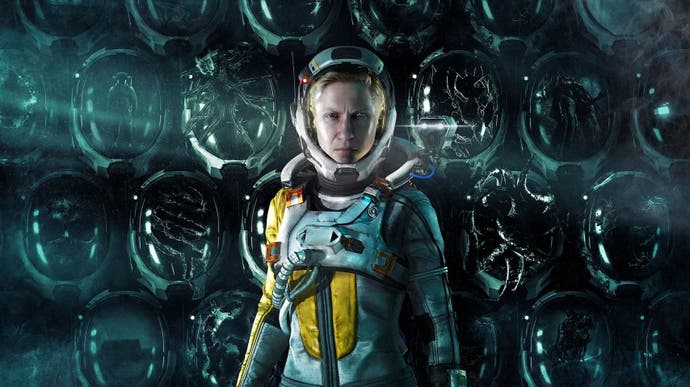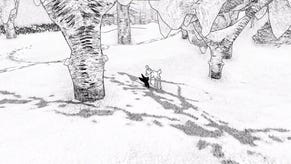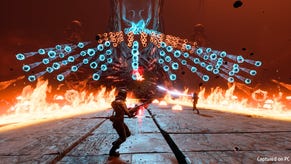Returnal review - magnificent and monstrous
Groundhog die.
Sometimes, when you talk about games, it helps to think about their personalities: what do they want from you? How do they behave? What role do you play in the relationship here, and what do they think of you in return? Normally this is quite easy. Think about it and you'll find games will happily fall into their roles - courthouse jester, self-serious actor, cerebral engineer (I'm not going to say which is which). But in this case it's been tricky. Returnal is hard to pin down. But pinned it down I have: Returnal has the personality of a furious cat with a sore tooth, and it's your job to be its vet.
I'm saying this because Returnal is good - it's so good! - but it is incredibly reluctant to let you find that out. It hides its best moments, buries them, beneath repetition and frustration and a byzantine UI, but those moments are just extraordinary. Euphoric, even! It's in its interest and my own for it to just let me play it, but Returnal is a video game that does not want to be played.
The history is going to be important here, if we're going to pull all of this apart. Returnal is the latest from Housemarque, the Finnish team behind masterly arcade-style shoot-em-ups like Resogun, twin-stick shooters like Dead Nation and Alienation, and the superlative Nex Machina. It's their first "triple-A" one though, and with big budget comes big scope. Returnal's is vast - it wants to be everything. It's a roguelite, insofar as death returns you to the start and the dungeonlike world procedurally changes with each run through it. But it's also a metroidvania, handing out new abilities after boss kills which open up new paths. And it's a third-person shooter, obviously. But also a bullet-hell arcade game. And a first-person narrative horror. And a soulslike. It picks from Ridley Scott, Eugene Jarvis, Hidetaka Miyazaki, H.R. Giger. From Metroid, P.T., Control. From Defender and Vanquish. Pick your poison - Returnal stocks everything and almost everything is sublime.
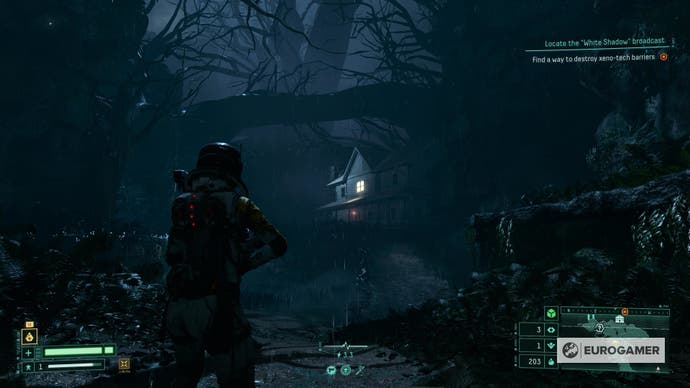
Story first. Returnal's story - which I should warn you I haven't finished and probably never will, but more on that later - is fantastic, at least so far. And I say story in the widest possible terms, because Returnal's a rare case of a game that understands the unmatched breadth of what a game's story can be. The setup is you, Selene, crash on a deeply hostile planet called Atropos for an unknown reason, seemingly defying an order. The execution is through everything the game has.
Selene is voiced with stern perfection by Jane Perry, (with likeness from Anne Beyer): cold, assertive, a scouting warrior-scientist who's first reaction is to catalogue and enquire, to talk to the monsters before shooting them to bits. Through her lens the world is all flora and fauna, but gradually that lens is smashed. She's chasing the "white shadow", a signal broadcast from somewhere on the planet that she is guided to, or lured toward, by the vision of a 20th century astronaut.
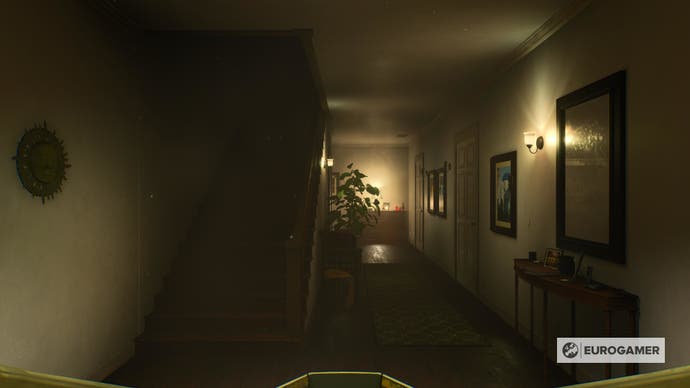
This becomes her God of the Gaps, the thing that answers what science can't: why, for instance, each time Selene dies she wakes up, back at her crashed ship, back at the beginning of the trail, the end of which she assumes must be at that white shadow. There's a spooky house you visit along the way (where suddenly you're in first-person), there are audio logs of past and future dead Selenes, suffering varying levels of madness (there's a Dark Souls-y element to this: some found bodies mirror the deaths of other players, whom you can choose to "salvage" for resources or "avenge" with a mini boss fight) and there are xeno-archives to tour and xeno-runes to collect that offer varying dollops of a kind of space-Greek mythology. It's very Remedy, if we're doing references again - disquiet and implied horror, but never overt. (Which makes sense: Returnal shares talent with Remedy in narrative designers like Gregory Louden and Eevi Korhonen, and what talent they are).
But again, this is really the beginning of what counts for story. It's also the mastery of the other things, the miscellaneous: the sounds of it, the squelching, dripping, gurning noise of the world that tells you it's rotten, putrid, old. It's the fog, the swirls of sand, the thick, polluted haze, the retro-future menus and computers - Returnal is always partially obscured, hard to read, half-intelligible. The use of quiet and echoed sound, robotic honks or gurgled growls through smog and forest, alien life that's dormant, but very much waiting to come alive (and subsequently pull you apart). The third biome, a long-dead, incomprehensibly vast robo-citadel, is a work of art, arguably the best sci-fi world I've visited in a game. Even the controller itself is in on it, clicking and rolling and crunching wonderfully in the hand, doing the whole "first big exclusive on next gen" thing by frankly just showing off. These are small things, but things that pull in the direction of the story, brushstrokes going in the same direction, and this stuff is hard, as is obvious from the rareness of such cohesion and the games that pull it off.

What Returnal's going for with all this, and achieving, is a sense of hostility. A hostile planet, Selene's hostile thoughts, a place you do not want to be. It continues in the action, although the actual results here are mixed. Returnal has six "biomes", each with a boss at the end that blocks your progress to the next. Each biome is made up of a series of areas, almost rooms, which reshuffle each time you die and are linked by two kinds of door, a "main path" one that links to other main rooms and objectives, and a "side path" one that links to items or other "discoveries" (crucially, these are not always good, but again more on that later). In the first biome, a murky, midnight blue forest, all that can make navigating a little tricky; the map is fine, if not the clearest, the world is dark, if unproblematic on a fancy OLED with HDR and all the luxuries (I suspect this will be a recurring theme this generation), and in the early stages one room can blur into the next, at least until you've been through them all so many times that even the shortest stretches of connective tissue become committed to muscle memory.
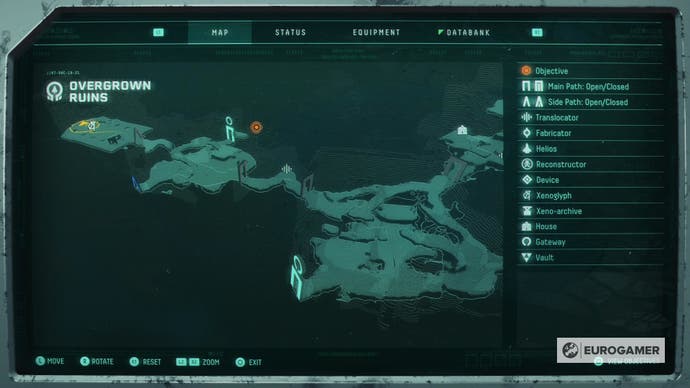
This is fine - it's all hellish ambiance and I'm all about that - but artful hostility starts to feel like actual hostility after a little while. Take checkpoints: did you know there are checkpoints? Well there are and there aren't. Returnal purposely avoids explaining things properly, and it takes pleasure in encouraging you to gamble on an unknown device and then punish you for doing so. So you might see a room with some kind of body-shaped alien device in that says something about restructuring biological thingymajigs, and that it has an extortionate Ether cost attached (Ether is an ultra-rare resource that is the only thing to carry over from one run to the next), and you might think, on your first lengthy run in a while, "better not take the risk" - or you might spend a fortune on it but be right near the start of the run, and realise it was a total waste, four or five hours of resources down the drain. Either way, once you do, you will discover something else: that checkpoints only work once per run, so you better be sure when you spend half a day's resources on one.
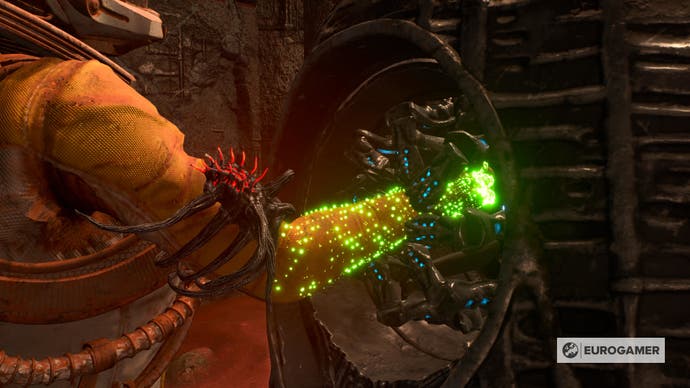
Beyond that of course it's the action. This is not the same as other Housemarque games. In fact it's not really the same as anything. It's an odd hybrid. Selene's movement is slick, taught, poised, immaculately responsive. Sprinting is superhuman. Dashes, with infinite use and very low cooldowns, grant you i-frames - invincibility from anything - while weapons work via overheating rather than ammo. Enemies pump out waves of various orbs, with the odd laser, the odd rapid melee, the odd explosion, and they're fine, but the majority of combat doesn't really get above that. Guns are satisfying but they are all just guns, not getting distinct enough until you're about halfway through the game. Melee is satisfying but, beyond the odd damage boost or something similar, I haven't found anything exotic enough to call a functioning melee build. Builds in general feel less like builds and more a mess of blessings and curses, too randomly determined to push you to a particular style of play.
The result is in the inbetween, the moments that make the bulk of your playtime, Returnal's combat is ever so slightly disappointing. It's a game of endurance, about keeping on the move and not making silly mistakes, scrounging around for scraps of health or a gun with marginally higher rate-of-fire. The systems, of which there are so many, don't really congeal into anything recognisable until you do fight a boss, at which point - BANG! Housemarque.
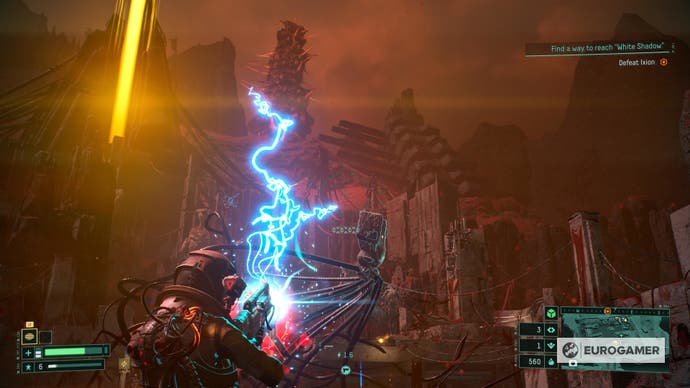
Like Resogun or Nex Machina, Returnal is actually best at its hardest - when it's beyond hard, even, the point where there's so much on the screen you have to enter a kind of trance, hypnotised by swirls of projectiles, particles, bolts of instant death, Bobby Krlic's screaming, raging techno-metal blurring with giants' roars and conjuring a kind of subliminal survival beat, a rhythm to which you must stick in order to dodge, dash, fire, reload. Play these sections on instinct and the unconscious mind and you'll come out the other side of difficulty into something else entirely, something oddly serene. These are where you see the history as heritage, how it's more than an obligation or slavish devotion but something to be protected and preserved. It is totally unmatched.
And then what a thud back down to Earth. In comparison to those climaxes Returnal's regular combat can't find the right pacing, can't find a beat. It's stop-start and it spikes dramatically, flipping erratically from banal to cruel and often feeling like it wants to trip you up or catch you out - to piss you off, frankly, which it often does. This is where the hostility returns again: Returnal nicks Gears of War's active reload (why haven't more games pilfered that?) but it insists on making it more risky, more awkward, more of a gamble. Reload is mapped to the same trigger as fire, which means watching every spray, every tap, to ensure you pause and restart at the perfect moment lest you screw yourself into a jam. It maps aim to a half-pull of the left trigger, your super-like Alt-Fire to a full pull, which feels like a superfluous skill-check on how hard you grip your controller (turns out for me: like my life depends on it).
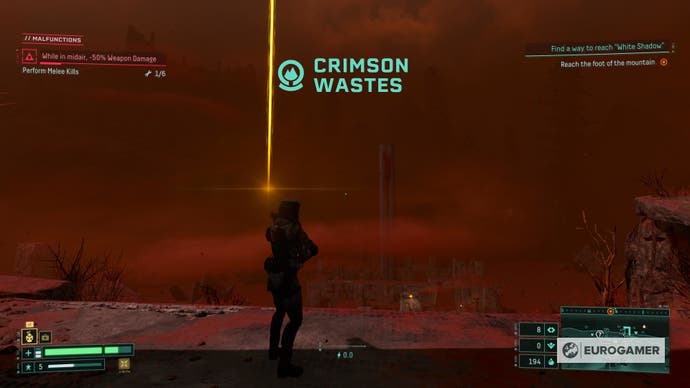
Further still its Returnal's inscrutable UI, which is a purposeful play for immersion in Selene's own brain fog - shoutouts in particular to the early-game map, which landed me in an accidental rematch with the first boss, and the laughably small cooldown meter for your Alt-Fire, a teenie tiny square which must be about four pixels wide. A cooldown meter for ants.
Most troublesome of all though is the world itself, the way its arranged, the way you navigate it, the incentives it creates. Atropos is almost a masterwork. Depending on what you're doing it expands and contracts. When you first enter a new biome it's vast. You don't know how far away the end is, you don't know what lies the other side of any door, down any secret passage, in any chest. It takes hours upon hours to explore. There are scores of set areas in the procedural pool that each run pulls from. Everything is lethal. Everything is alien and new. At this point it's sublime - but there are just six biomes, and they each only make that first impression once. Beyond that, when you reach a boss, it contracts, the game folding in on itself, almost losing its own confidence: a shortcut makes itself available to you, and suddenly you've no urge to explore, no incentive to, crucially, because of the risk.
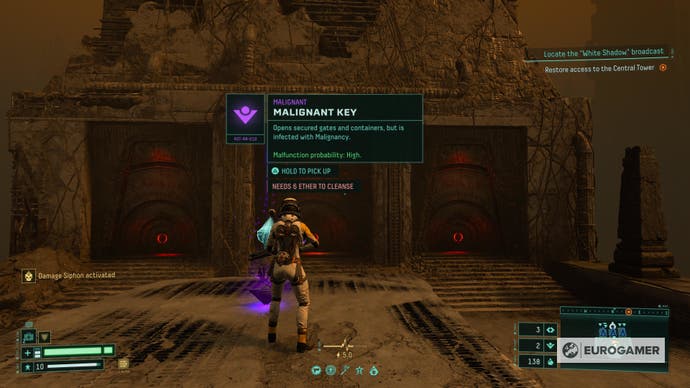
From then until you beat that boss, you are trapped in a miserable loop - clearly intentional; this is Selene's fate, after all - and it makes for a dilemma where both options equal pain. Everything you do in Returnal becomes a gamble, and the currency you wager with is your time. Do I take my time and grind the first world, that you must always necessarily trudge through on death, likely earning a larger health bar, more consumables, more single-run passives? You'd think always yes - but with almost every other pickup comes a gamble, via Returnal's Malevolence system, where some items inform you they are essentially cursed and have a set chance of whacking you with a suit malfunction (e.g.: you can't swap weapons until you kill 15 enemies; healing is halved until you kill four enemies at once, et cetera) or chipping away your health. And there's always the very real risk of death by mini boss or misadventure. The alternative on the fork is to sprint straight to the boss, which might take half an hour as opposed to one or two, but gives you a much worse chance at actually beating it. Dare I try it without an expanded health bar? It becomes a question of not "what's the most fun?" but "what feels the least worst?" Grinding for two hours and getting screwed by bad luck, or banging your head against the wall for several half-hour runs in a row?
This is what's stopped me from getting to the end. Exhaustion, over actual difficulty. Bosses only take a couple of tries to beat, some even go down on first attempt, but getting back to them is so arduous, so unpleasant. Suddenly all the peerless beauty of Atropos' worlds becomes overfamiliar, Selene goes totally quiet - no more new fauna to log - and it's just you and the same old monsters. Everyone's extraordinary work on this game begins to unnecessarily grate.
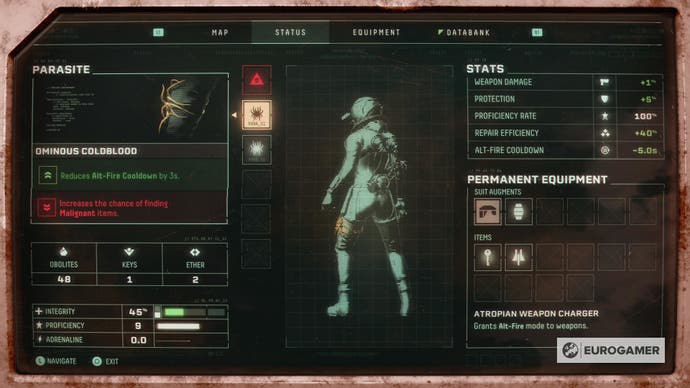
It comes back to the combat. And the hostility, for that matter. And the history. And the ambition of what Returnal is really after. This is the ugly side of the roguelite rearing its head, in cahoots with the ugly side of the arcade. There's an implication, from the way Returnal is structured, that it must be harsh to be authentic; that to make permadeath less permanent by, say, making carry-over resources a bit more viable to grind, or the bad luck a bit less punishing, would be to water it down. In fact it would be the opposite. This is what good roguelites do: they recognise that getting very far on a very good run and then dying - by bad luck, bad play, or just losing focus for one moment - doesn't feel great, and so they load the best parts of the games into the run itself, as opposed to the end goal. This is why Hades' randomised builds always make you feel like a god at a minimum, why FTL tells its stories through the impossible blind decisions themselves, why Spelunky makes sure that when it kills you, it kills you with an anecdote: "I used all my ropes and then fell down a hole". The genre itself is hostile; it's the game's job to invite you back.
Returnal gets halfway to doing it. It is full of real, bona fide video game magic, but with each death it becomes less special, more mundane, and this is why it feels so difficult to pick up the controller again, why Returnal feels like it doesn't want to be played. But the magic it does have is transcendent. And so I do still want to play it - whether Returnal likes it or not.
